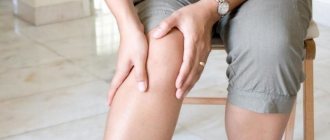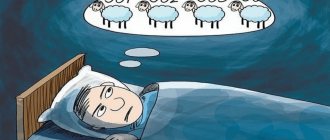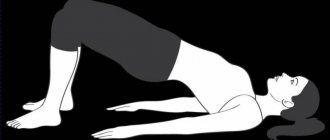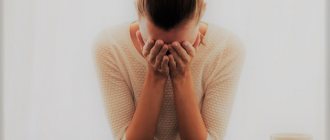5 minutes
1347
According to the National Sleep Foundation, people need different amounts of sleep depending on their age:
- Newborns (0-3 months) - 14-17 hours
- Infants (4-11 months) - 12-15 hours
- Children (1-2 years old) - 11-14 hours
- Preschoolers (3-5 years old) - 10-13 hours
- Children (6-13) - 9-11 hours
- Teenagers (14-17 years old) - 8-10 hours
- Adults (18-64) - 7-9 hours
- Elderly people (65+) - 7-8 hours
Pregnancy and various illnesses can increase your daily need for sleep. Older people sleep a little less and tend to have shorter periods of deep sleep, which is necessary for the body to recover. With age, the risk of sleep disorders also increases, and primarily insomnia (insomnia). It is also known that people over 65 years of age are more susceptible to mental disorders that occur due to lack of sleep.
Sleep and biorhythms
One of the main biological rhythms is the circadian rhythm - 24 hours.
The human body synchronizes with the cycle of day and night, and the period from dusk to dawn is most favorable for sleep. It is believed that 8-9 hours is the optimal sleep duration, and experts advise falling asleep before 11 pm. However, the quality of sleep depends not only on its duration and time of rising. Chronobiology as a science arose in the 18th century. She studies periodic phenomena that occur in living organisms over time. These cycles are called biological rhythms. Chronobiological work includes research in the field of comparative anatomy, physiology, genetics, and molecular biology.
There are two phases: rapid and slow sleep.
Slow sleep:
- Stage I 10–15 minutes. State of drowsiness.
- Stage II 20 minutes. Deeper sleep, but the person remains sensitive to external sounds.
- Stage III 45 minutes. The stage of deeper immersion in sleep.
- Stage IV Deep sleep. 45 minutes.
REM sleep is the fifth stage of sleep and lasts about 60 minutes. A sleeping person is in the most active state; dreams can be remembered. This period is called “paradoxical”, since during this phase the muscles remain relaxed, but the brain, on the contrary, is active and ready to perceive and process information. For healthy sleep you need to go through 3-6 cycles. An easier rise is expected during the light sleep stage - stage 1 or 2.
In accordance with these phases, various applications and gadgets work that analyze sleep and select the most suitable period for getting up. You can calculate these stages yourself and determine the time at which you need to get up.
Therefore, if one of these phases is disrupted or the transition between them occurs too quickly, sleep disturbances occur, regardless of its duration. Disturbed nighttime sleep not only affects daytime functioning, but is also associated with various adverse health effects such as obesity, decreased quality of life, and even mortality.
Why memory?
This and a number of previous studies show that people who don't get enough sleep have higher blood pressure, higher rates of diabetes and narrowing of blood vessels. As a result, blood flow to the brain, which requires oxygen and glucose to function effectively, decreases.
Lack of sleep can also impair memory. It was found that in the body of mice that were not allowed to sleep, the transmembrane protein beta-amyloid is formed more intensively. In the human body, beta-amyloid is the basis of amyloid plaques in Alzheimer's disease. Their concentration in the brain leads to deterioration of memory and thinking and increases the risk of dementia.
What harms our sleep
Using gadgets before bed
Light from electronics sends alarm signals to the brain. The circadian rhythm appears to be particularly sensitive to short-wavelength light, particularly blue light in the 460-nanometer region of the electromagnetic spectrum. It is emitted by gadgets, as well as energy-saving light bulbs. This light, according to research from the international Sleep Foundation, delays the release of melatonin, a hormone produced for healthy sleep.
Melatonin tells the body that night has fallen and prepares it for sleep, but light from gadgets interferes with its production and causes anxiety.
In other words, gadgets keep you in an excited state before going to bed and will not allow you to enter the deep sleep stage for a long time. Therefore, it is necessary not to use gadgets at least an hour before bedtime and reduce the light.
Strong odors
Certain smells can affect your sleep. For example, the Sleep Foundation has determined that lavender lowers heart rate and blood pressure. This can potentially lead to a more relaxed state. In the study, researchers monitored subjects' brain waves at night and found that those who smelled lavender before bed slept more soundly and felt more alert in the morning. Another study of infants found that they cried less and slept more soundly after bathing in lavender-scented oils. Of course, lavender is not a cure for insomnia, but having oils, candles or sachets in the room can be calming.
However, overly strong scents can also disrupt your sleep. In particular, it is necessary to carefully select detergents. Some of them can cause irritation and, as a result, cause the body to be in an excited state, even if the thoughts do not interfere with sleep.
Late physical activity
If you engage in active physical activity before going to bed, your body will remain awake afterwards, even if you think you are tired and ready to sleep. The muscles are under tension for at least another two hours (depending on the intensity of the activity). By exercising before melatonin production begins (on average, the process begins at 8 pm), you, on the contrary, will help you fall asleep faster and stay healthy. Physical activity is not advisable at least two hours before bedtime. For example, if you go to bed at 11, exercise should end at 8 pm.
Caffeine consumption
Caffeine isn't just found in coffee and energy drinks. The body can be stimulated by drinking Coca-Cola, cocoa, dark chocolate, and strong tea. Accordingly, other desserts containing these ingredients are also not recommended to be consumed before bed.
Uncomfortable temperature for sleeping
Thermal environment is a key factor for sleep, say researchers at the National Institutes of Health. Ambient temperatures that are too hot or cold can affect the sleep of even healthy people who do not suffer from insomnia. Among various environmental thermal factors, the relationship between clothing and bedding use varies greatly between humans and animals. The effect of temperature on sleep stages varies depending on whether subjects are semi-naked or using bedding and clothing. This greatly helps in maintaining body temperature at an acceptable thermal level in various environments.
The optimal temperature for sleeping is 20 degrees; the room must first be ventilated. Accordingly, at this temperature, clothing and blankets should not increase your body temperature, but maintain it. Melatonin is more actively produced in a cool, ventilated room, since blood circulation improves in such an environment.
Source: Pim Chu / unsplash.com
Too much of a good thing is also bad
Different people need different amounts of sleep. It depends on age, health, work schedule, amount of stress and activity level. On average, the Centers for Disease Control and Prevention
They say that ideally you need to sleep 7-9 hours a day.
Chronic oversleeping is not only when you try to sleep longer on the weekends, but also when you sleep a lot on a regular basis. This disease is called “hypersomnia”
- pathological drowsiness.
No matter how long people with this condition sleep, whether they try to take naps during the day or sleep too many hours at night, nothing can help them get rid of drowsiness. Moreover, those who suffer from hypersomnia experience anxiety, low energy levels, memory problems, and get tired very easily.
However, scientists believe that not all people who sleep too much have hypersomnia, as a huge number of different unrelated factors can affect excess sleep.
Depression, alcohol use, certain medications, and sleep apnea (a condition in which a person stops breathing while asleep, disrupting their normal sleep cycles) are all things that can cause you to sleep too much.
What are parasomnias
Unhealthy sleep can also be associated with more serious disorders - parasomnias. This is a group of sleep disorders that are characterized by unusual behavior of a person during this period. There are four classifications of such deviations according to the phases of sleep.
The most common form of parasomnia is associated with slow-wave sleep. This includes sleepwalking (in other words, sleepwalking), night terrors and awakenings. The brain does not have time to move from one phase of sleep to another while in a state of wakefulness, which is why various deviations arise that are not realized by the person. Sleepwalking is the so-called sleepwalking. The human body wakes up, while his brain continues to sleep, so the next morning he does not remember anything. Night terrors are common in children, but the condition also occurs in adults. One reason may be increased levels of anxiety.
The next disorder is confused awakening, associated with disruptions in the transition from the slow stage of sleep to the fast stage. A person can wake up and perform some physical actions, but at the same time he does not yet perceive the world around him and may react inadequately to it, since the brain structures responsible for processing information are not yet fully functioning.
The fourth type of disorder is night eating syndrome. People may eat at night and not realize it. Some brain structures continue to sleep, while others force the body to function. Moreover, researchers do not associate this phenomenon with a lack of food; the reasons for this behavior are still unclear.
One of the most common sleep disorders is restless legs syndrome. During sleep, discomfort occurs in the legs, causing the person to wake up. This often leads to chronic insomnia. If the above deviations are observed for a long time, it is better to consult a specialist.
Causes of drowsiness
From the above information we can conclude that sleeping for a long time is harmful to the body. However, what to do if you want to sleep? This desire should not arise too often.
If drowsiness haunts a person every day, then perhaps the reasons lie in the following:
- drowsiness may be associated with diseases, for example, hypersomnia, diabetes, thyroid;
- if a person leads an active physical life during the day, then it will take him longer to regain strength;
- due to the lack of sunlight, in autumn and winter, a person sleeps more;
- Taking certain medications causes drowsiness;
- drinking alcohol requires sleep;
- There is a type of people who enjoy long sleep.
What does sleeping too much lead to?
Several long-term studies have shown that hypersomnia can cause a wide range of different, severe and debilitating symptoms.
Coronary heart disease.
A survey of approximately 72,000 women in the United States found that 38 percent of those who slept 9 to 11 hours each night had coronary heart disease.
Diabetes.
A study of about 9 thousand Americans found a link between sleep and increased risks of diabetes. Although the scientists didn't establish a direct link, they did find that people who sleep more than 9 hours a night have a 50 percent greater risk of developing diabetes than those who sleep 7 hours. Scientists believe that “oversleeping” in itself does not lead to diabetes, but only accompanies some health problems, which then lead to the onset of the disease.
Obesity.
Other studies have found that people who sleep 9 to 10 hours each night are 21 percent more likely to be overweight over 6 years than those who sleep 7 to 8 hours, even though their eating habits are similar.
Shortened life expectancy.
Some of the most alarming research findings have shown that there is a possibility that oversleeping may lead to earlier death. In 2002, scientists from the American Cancer Society conducted the largest study to find a link between sleep and mortality. They analyzed data from 1.1 million Americans aged 30 and older over a period of 6 years. It was found that people who slept 8 hours each night were 12 percent more likely to die during the study period than those who slept 7 hours. Moreover, those who only needed 5 hours of sleep lived longer than those who needed 8 hours or more.
Based on these results, Professor Daniel Kripke
from
the University of California,
San Diego, reported that
"people who average 6.5 hours of sleep can be confident that this is a normal amount of time for health benefits and that no more sleep is needed."











